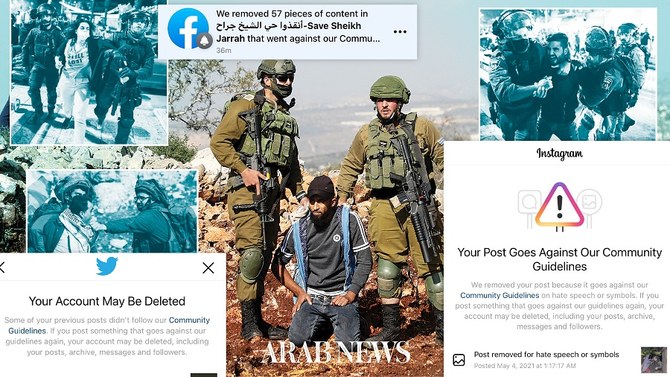DUBAI: Imagine the pain of being kicked out of your own home. Then imagine being unable to let the world know what is happening to you.
This is the reality for Palestinians living in Jerusalem’s Sheikh Jarrah neighborhood, which houses 28 families from the 1948 Nakba. Under international law, East Jerusalem is considered part of the Palestinian Territories.
Earlier this year, the Israeli Central Court in East Jerusalem approved a decision to evict four Palestinian families from their homes in the neighborhood.
The court was scheduled to issue a ruling on the evictions on May 6 amid heated demonstrations and clashes between Palestinians and Israeli settlers, but the decision was delayed until May 10.
Hundreds of social media users have accused Instagram and Facebook of removing content and accounts reporting on the Sheikh Jarrah violence.
One of the videos that was deleted from the story archives of Palestinian journalist Maha Rezeq was about Israeli settler Jacob, who took over the house of Muna El-Kurd in 2009. He told her that if he did not steal her house then someone else would.
“What I’ve been sharing is raw footage, videos, testimonies of people on the ground, some are actually coming from the mouth of an Israeli, the mouth of a settler, why is that controversial? Everything was self-explanatory, there is no blood or graphic footage that violates the community standard,” Rezeq said.
Rezeq told Arab News that only her content on Sheikh Jarrah was removed.
“The only thing that was removed from my archive were stories and posts related to exposing Israeli crimes against Palestinians.”
Mohammed El-Kurd, a Palestinian writer from Jerusalem, was posting videos and stories on violence in Sheikh Jarrah when he received a warning that his account might be deleted.

“Some of your previous posts didn’t follow our Community Guidelines,” the message read. “If you post something that goes against our guidelines again, your account may be deleted, including your posts, archive, messages and followers.”
Facebook also removed “57 pieces of content” from his page because they went against the guidelines.

Yasmin Dabat said her stories with the hashtag #SaveSheikhJarrah, dated to May 3, were “removed by Instagram without any warnings or updates.”

Instagram, which is owned by Facebook, tweeted it was facing technical issues on May 6, after hundreds of people began reporting the censorship.
“We know that some people are experiencing issues uploading and viewing stories. This is a widespread global technical issue not related to any particular topic and we’re fixing it right now. We’ll provide an update as soon as we can.”
We know that some people are experiencing issues uploading and viewing stories. This is a widespread global technical issue not related to any particular topic and we’re fixing it right now. We’ll provide an update as soon as we can.
— Instagram Comms (@InstagramComms) May 6, 2021
Nadim Nashif, the director of a nonprofit organization called 7amleh that advocates for Palestinian digital rights, said the explanation did not make sense to them.
“(It) is very weird, like you know, to compare what happened in a certain neighborhood in Jerusalem, with huge countries like Canada, the US and Colombia, doesn’t sound logical to us, doesn’t sound like it’s really explaining, because in Canada and the US they were taking down stories that are about various topics, (but) here (it was) about (a) certain hashtag, specifically about Sheikh Jarrah,” he said.
Nashif said the censorship of Palestinians happened through two channels.
“One factor is what the Israelis are doing, they are basically trying to push the social media platforms to adopt their own standards of what should be there and what shouldn’t be there. There’s strong cooperation between them and Facebook mainly.”
According to Nashif, this leads to what’s called “voluntary takedowns,” where Israeli cyber units send requests to social media platforms to take down specific content without a court order.
Another way that Palestinian content was pushed out of social media was through “armies of trolls and applications called Act.IL organizing people to report in a massive way,” he added.
Act.IL is an app that describes itself as “the place where all pro-Israeli advocates, communities and organizations meet to work together to fight back against the demonization and delegitimization of the Jewish state.”
According to the app, users “will be able to remove inciting content from social media, fight antisemitism and anti-Zionism, influence the online narrative regarding Israel, and take part in special pro-Israel campaigns and efforts.”
Palestinians are also being silenced on social media through the use of Artificial Intelligence by those platforms to identify what content violates their user guidelines.
“Social media platforms are (using) artificial intelligence for takedowns and there is lots of use of keywords, mainly around what the US government consider(s) as terrorist organizations,” Nashif explained.
Some of those who reported content takedowns and account removals to 7amleh were able to restore their content after the organization reached out to Facebook.
“We managed to restore tens or hundreds of them in this struggle, because we are (a) trusted partner of Facebook,” Nashif added.
Dabat was able to recover her stories around 12 hours later after getting in touch with Instagram.
“I emailed Instagram directly mentioning this and applied pressure on them to put them back. They then put them back without replying to me,” she said.
Nashif said the system was still biased despite the restoration of content and accounts.
“We (haven’t) managed to get a transparent, clear system of content moderation. The keyword here is transparency and equality, because this is not happening in the Israeli side.”
Instagram hid the hashtag #الأقصى (Al-Aqsa in Arabic) two days ago, when Israeli police in riot gear were deployed in large numbers as thousands of Muslims held Tarawih prayers. Medics said over 200 Palestinians were wounded that night.
منصة #إنستغرام تمنع تداول هاشتاق #الأقصى الآن على منصته وتظهر هذه الصفحة للمستخدمين عند دخولهم إلى الهاشتاق.#انقذوا_حي_الشيخ_جراح pic.twitter.com/HmYlaQIsZC
— Yasser (@yasserashour95) May 7, 2021
“Part of the escalation that happened is that they were even taking down hashtags, I mean they were hiding hashtags like Al-Aqsa, which is something new,” Nashif said.
He advised social media users to continue reporting instances of censorship through their platforms and contact organizations that handled these issues to raise awareness and correct such behavior.
Instagram sent a clarification on May 11 to Arab News about the removals of accounts and posts related to Sheikh Jarrah.
“Earlier this week, many of our Instagram users faced significant issues accessing certain hashtags and content - including our Palestinian community. We sincerely apologize for the frustration this has caused and assure you that we were in no way trying to limit anyone’s ability to freely express themselves,” the statement read.
On Thursday, the UN Special Coordinator for the Middle East Peace Process Tor Wennesland urged Israel to cease demolitions and evictions in Sheikh Jarrah in line with its obligations under international humanitarian law.
On Sunday Prime Minister Benjamin Netanyahu said Israel rejected pressure not to build in Jerusalem, after days of unrest and growing international condemnation of planned evictions of Palestinians from homes in the city claimed by Jewish settlers.
“We firmly reject the pressure not to build in Jerusalem. To my regret, this pressure has been increasing of late.”
Last week, the Red Cross reported that 22 Palestinians were wounded by Israeli police in annexed East Jerusalem.
























